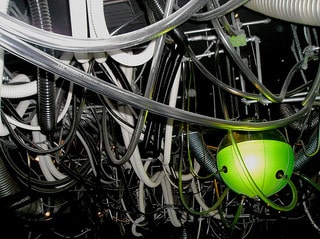You may have recently noticed the TJP site loading a little more slowly than normal, especially if you’ve accessed our site from Europe. As our Associate Editor for Operations Sam Sawyer has discovered the hard way, I’m more than a little obsessed with our site’s speed. When our average load time increases 25-30% practically overnight, I tape up my glasses, don my pocket protector, and go hunting for a reason why.
It turns out that our site was slower because the Internet almost broke. The Internet is a network of networks, a collection of smaller networks linked up at a few, key places. Those few (roughly 12) places form the backbone of the Net, and can transport staggering amounts of data. If something were to crush one of the vertebrae in that backbone, it could paralyze the entire beast.
Around March 27, that almost happened. Attackers tried taking the anti-spam website spamhaus.org offline by overloading it with visits. The attackers fired their salvo by turning poorly configured bits of the Internet against itself. While this sort of attack is fairly common and relatively easily mitigated, the sheer size of the attack seems to be unprecedented. One of the networks that form the backbone of the Net reported seeing 300Gbps of traffic related to the attack. For perspective, that’s roughly a small hard drive of information thrown against a website every second. Even the best modern equipment set up cleverly by excellent engineers would have difficulty dealing with so much traffic.
This attack highlights something important, and often overlooked: that we owe it to the common good to manage our electronic resources well. So how can we be better stewards of this shared tool we call the Internet? Some pretty straightforward steps may help. If you know (or maybe even employ) somebody who runs a network, make sure your equipment is set up properly to prevent this sort of attack. Optimizing your website can also help to reduce the amount of data being transmitted.
Environmentalists often note that we’re all in the same boat – that everybody’s treatment of the environment affects everybody else. The same goes for the Internet. The structure of the Net makes it so that the way we steward electronic resources affects everybody else. Considering the ways the Internet impacts education, economics, and politics, proper stewardship of the Net is very much an ethical issue.
